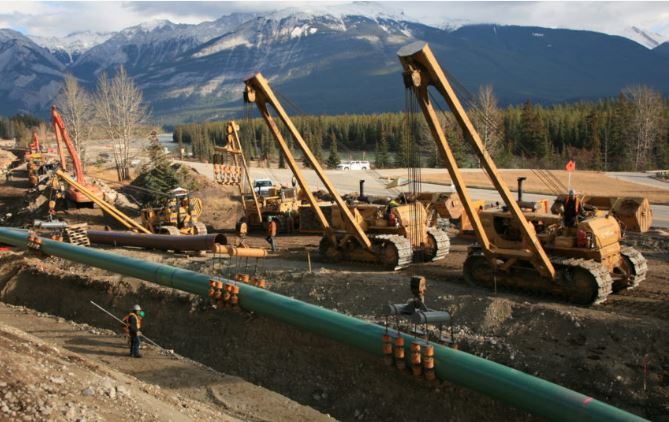Court rules against B.C. in Trans Mountain Pipeline case

Kinder Morgan's Trans Mountain Expansion Project. Source: Kinder Morgan.
By Peter Kennedy
The British Columbia government has lost a round in its battle to control the flow of heavy oil into the province, a move that if it succeeds, would effectively kill the Trans Mountain Pipeline Expansion Project.
In a unanimous decision released on Friday May 24, the B.C. Court of Appeal said legislation to limit the flow of increased amounts of heavy oil into B.C. would be in direct conflict with federal jurisdiction over interprovincial pipelines.
The panel of five judges found that proposed amendments to B.C.’s Environmental Management Act, if they came into effect, would scupper the National Energy Board’s role in approving projects that are in the national interest.
B.C. Premier John Horgan, who has vowed to “use every tool in the toolbox to block the Trans Mountain expansion,” said he is disappointed with the decision, and hinted that he will launch an appeal.
It is widely expected that the B.C. government will take its case to the Supreme Court of Canada.
The Canadian government became an owner of the Trans Mountain pipeline in May, 2018, following a $4.5 billion purchase agreement with former owner Kinder Morgan Canada [KML-TSX].
Shareholders of Kinder Morgan Canada voted overwhelmingly to approve the sale on the same day that the Federal Court of Appeal quashed the approval of the $7.4 billion Trans Mountain Pipeline expansion on the basis that Canada’s efforts to meaningfully consult with Indigenous people fell short.
When the ruling was announced, the court also criticized the lack of attention given to how increased tanker traffic off the cost of British Columbia would affect the resident killer whale population.
The original Trans Mountain Pipeline was built in 1953 and continues to operate today. The proposed expansion is essentially a twinning of the existing 1,150-kilometre pipeline between Edmonton, Alberta and Burnaby, British Columbia.
Expected to cost approximately $7.4 billion, it will create a pipeline system with a nominal capacity rising from 300,000 barrels per day to 890,000 barrels per day.
The Canadian government elected not to challenge a court decision that put the brakes on the Trans Mountain Pipeline expansion.
Instead, Ottawa said it would resume consultations with Indigenous groups that will be affected by the project.
Canadian Natural Resources Minister Amarjeet Sohi said Ottawa was going to work with First Nations and Metis communities to seek their views on how to get Phase 111 [of the process] right.
Meanwhile, Prime Minister Justin Trudeau is facing huge pressure from Alberta and its newly elected Premier Jason Kenney to get the Trans Mountain pipeline expansion approved and built, so that Alberta’s resource sector can move more of its oil offshore to markets in Asia.
“I was elected on a mandate to be obsessed about job creation,” Kenney said, adding that he firmly believes that the Trans Mountain pipeline will be built.
Prior to the court ruling that has stalled the project, Finance Minister Bill Morneau said Ottawa does not plan to be a long-term owner of the pipeline and is in negotiations with interested investors.
Morneau has made it clear that Indigenous participation in Trans Mountain through equity and revenue sharing would be welcomed. Bands in Alberta and B.C. have expressed an interest, backed by pension funds, and Stephen Buffalo, President of the Indian Resource Council (IRC) of Canada said in March, 2019, that there is “no shortage of Canadian money.”
The IRC is backing a potential bid and has said the majority of its 134 member First Nations are interested in an ownership stake.
Alberta-based senator Doug Black introduced Bill S-245 the Trans Mountain Pipeline Project Act in the Senate last year. His aim was to declare that the pipeline expansion project is in the national interest and should proceed for that reason.
Not having access to energy markets is costing Canada billions of dollars and the expansion of the Trans Mountain pipeline system between Edmonton, and Burnaby, B.C., is a critical solution to this problem, Black said.
